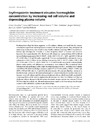Please use this identifier to cite or link to this item:
https://accedacris.ulpgc.es/jspui/handle/10553/6552
| Title: | Erythropoietin treatment elevates haemoglobin concentration by increasing red cell volume and depressing plasma volume | Authors: | Lundby, Carsten Thomsen, J. Boushel, R. Koskolou, Maria D. Warberg, Jorgen Calbet, Jose A. L. Robach, Paul |
UNESCO Clasification: | 241106 Fisiología del ejercicio | Keywords: | Adults Aldosterone Erythropoietin Hemoglobin Blood |
Issue Date: | 2007 | Journal: | Journal of Physiology | Abstract: | Erythropoietin (Epo) has been suggested to affect plasma volume, and would thereby possess a mechanism apart from erythropoiesis to increase arterial oxygen content. This, and potential underlying mechanisms, were tested in eight healthy subjects receiving 5000 IU recombinant human Epo (rHuEpo) for 15 weeks at a dose frequency aimed to increase and maintain haematocrit at approximately 50%. Red blood cell volume was increased from 2933 +/- 402 ml before rHuEpo treatment to 3210 +/- 356 (P < 0.01), 3117 +/- 554 (P < 0.05), and 3172 +/- 561 ml (P < 0.01) after 5, 11 and 13 weeks, respectively. This was accompanied by a decrease in plasma volume from 3645 +/- 538 ml before rHuEpo treatment to 3267 +/- 333 (P < 0.01), 3119 +/- 499 (P < 0.05), and 3323 +/- 521 ml (P < 0.01) after 5, 11 and 13 weeks, respectively. Concomitantly, plasma renin activity and aldosterone concentration were reduced. This maintained blood volume relatively unchanged, with a slight transient decrease at week 11, such that blood volume was 6578 +/- 839 ml before rHuEpo treatment, and 6477 +/- 573 (NS), 6236 +/- 908 (P < 0.05), and 6495 +/- 935 ml (NS), after 5, 11 and 13 weeks of treatment. We conclude that Epo treatment in healthy humans induces an elevation in haemoglobin concentration by two mechanisms: (i) an increase in red cell volume; and (ii) a decrease in plasma volume, which is probably mediated by a downregulation of the rennin-angiotensin-aldosterone axis. Since the relative contribution of plasma volume changes to the increments in arterial oxygen content was between 37.9 and 53.9% during the study period, this mechanism seems as important for increasing arterial oxygen content as the well-known erythropoietic effect of Epo. | URI: | https://accedacris.ulpgc.es/handle/10553/6552 | ISSN: | 0022-3751 | DOI: | 10.1113/jphysiol.2006.122689 | Source: | Journal Of Physiology-London[ISSN 0022-3751],v. 578 (1), p. 309-314 |
| Appears in Collections: | Artículos |
Show full item record
This item is licensed under a Creative Commons License

